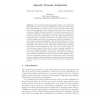2204 search results - page 6 / 441 » Agnostic active learning |
83
Voted
ALT
2009
Springer
15 years 10 months ago
2009
Springer
Motivated by the principle of agnostic learning, we present an extension of the model introduced by Balcan, Blum, and Gupta [3] on computing low-error clusterings. The extended mod...
235
Voted
DAGM
2011
Springer
14 years 25 days ago
2011
Springer
The supervised learning paradigm assumes in general that both training and test data are sampled from the same distribution. When this assumption is violated, we are in the setting...
128
Voted
ICVGIP
2008
15 years 2 months ago
2008
As vision algorithms mature with increasing inspiration from the learning community, statistically independent pseudo random number generation (PRNG) becomes increasingly importan...
127
Voted
INFOCOM
2008
IEEE
15 years 7 months ago
2008
IEEE
—As wireless devices and sensors are increasingly deployed on people, researchers have begun to focus on wireless body-area networks. Applications of wireless body sensor network...
90
Voted
COLT
2008
Springer
15 years 2 months ago
2008
Springer
In recent work, Kalai, Klivans, Mansour, and Servedio [KKMS05] studied a variant of the "Low-Degree (Fourier) Algorithm" for learning under the uniform probability distr...

